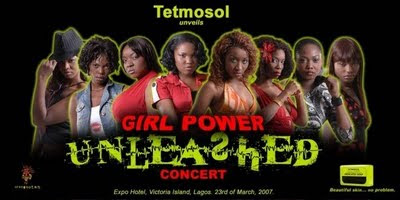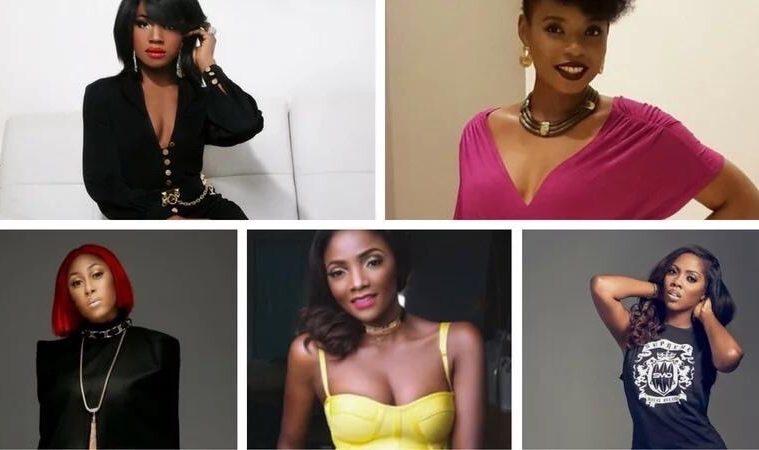The year was 1999, when a team led by the dynamic Ayo Animashaun, CEO of Smooth Promotions, owners of urban music channel, Hip TV put together the first of its kind, all female concert tagged Girl’s Night Out. The concert which ran for several years was aimed at giving female talents who had severally complained of not having equal platform to thrive in the music industry as their male counterparts an avenue to showcase their talent and have a night all to themselves. It was at one of such concerts that the likes of Azeezat got discovered.
In 2007, there was a renaissance of sort as a totally different organizer put together the Girl Power Unleashed concert. The event paraded strictly female acts like the lead vocalist of the defunct girl band Emete; Ashionye, alongside the likes of Sasha, Niyola, Kemistry, Zeal and Blaise all performing and was hosted by TV personality Funmi Iyanda.

The music industry is not such a sweet place for anyone, more so the female acts especially in a country like ours. The industry is heavily skewed towards the male acts not just in terms of performing artists but even in terms of key industry decision makers. For technical roles like sound engineering and production, outside a rare few like Simi, they are almost non-existent. The radio plays fewer female songs while labels sign fewer female artist, various reasons have been adjudged for this situation over the years. Reasons ranging from the female acts being placed on a standard beyond just the music, the average female artist is usually expected to have the voice of Beyonce, the body of Nicki Minaj and the baggage of Cardi B rolled in one for her to gain recognition.
There is also the case of the Nigerian female artists, perhaps for fear of being asked to offer ‘Payola in kind’, not putting in enough work in pushing the music or dedicated to the struggle. While issues of relationships, culture, marital commitment and motherhood have all played a role in hindering the career of the female artists. From the record label perspective, engaging a female artist is seen as being capital intensive, with only a few willing to take the jump.
Let’s take a genre like rap for example, there seems to be an unwritten rule that the average career lifespan of the Nigerian female rapper hardly goes beyond one project. The likes of B.O.U.Q.U.I and Weird MC have broken that myth and even they seem to be on sabbatical. Of the femcees that are still alive and rapping, Eva Alordiah seems set to join that hallowed list. After putting out 3 EPs, Eva finally released the 1960 album in 2016, and has sporadically released singles since then.
In contrast, Eva’s one-time contemporary Munachi Abii, has allowed her The Goddess, The Hustler album drag on and never see the light of day. She will probably only be remembered as a rapper for her spat with veteran emcee Mode 9 back in 2012. Equally disappointing is Pryse, whom a lot was expected from – especially after she got signed with Chocolate City, a label that was once home to three of the biggest rappers in the game. Fans expected that CCity’s experience and support will guide her towards grabbing a hold of the vacant throne but like the others before her, that now looks like a distant dream.
Across other genres, there have been a handful of talented ladies who have chipped in hit songs and held it down longer than a minute like Asa, Tiwa Savage, Yemi Alade, Omawumi, Waje and Chidinma. They’ve been able to maintain some degree of consistency with the likes of Di’ja, Emma Nyra, Lola Rae, Victoria Kimani, Cynthia Morgan, Aramide, Niyola (who has had more resurrections than Christ) enjoying occasional moments. But take a look at the top 10 songs chart across any Nigerian radio stations and probably only one female artist, if any makes the list on a weekly basis.
However, the past couple of years has witnessed a seeming change in the tide. The pool of female talents in the land has witnessed an expansion and they are finally getting a bit more time on the field of play. The likes of Simi, Niniola, Yemi Alade, Tiwa Savage and Sey Shay continue to send the message that great music is gender blind.
It may sound a bit too bold to proclaim but I fairly expect to see more female artists break into the mainstream this year. Traditional media remains of huge importance and is arguably still the most popular driver of fame and album sales in Nigeria but it is no longer the sole factor that determines the success of the artist.
Back in the early 2000s, it was impossible to get noticed or even perform at shows without your songs being a hit on radio but a lot of that has since changed as young female artists performed at various concerts over the December period without the hype of the traditional airplay.
The music is good, the myth about more female audience willing to listen to the opposite sex instead of supporting a fellow woman is being dispelled. The audiences are gradually identifying with the sound, and a fair number of them are now putting in equal work as their male counterparts in terms of promotion, performance and visibility. In 2018, the music will take centre stage, irrespective of the gender, the best music should always win and that is how best to drive equality within the industry.


